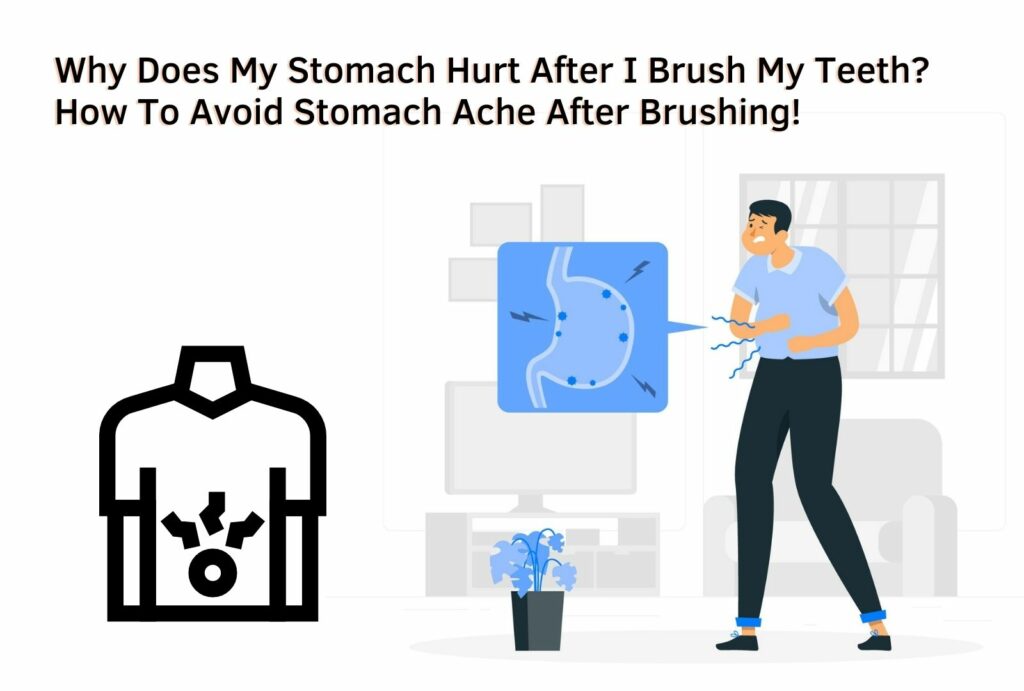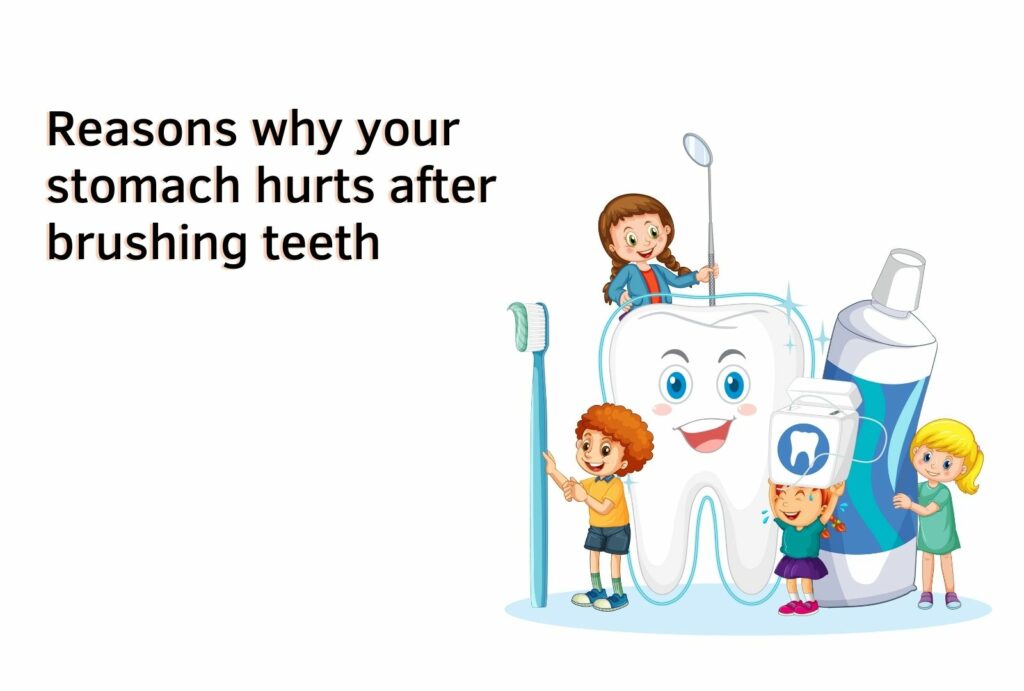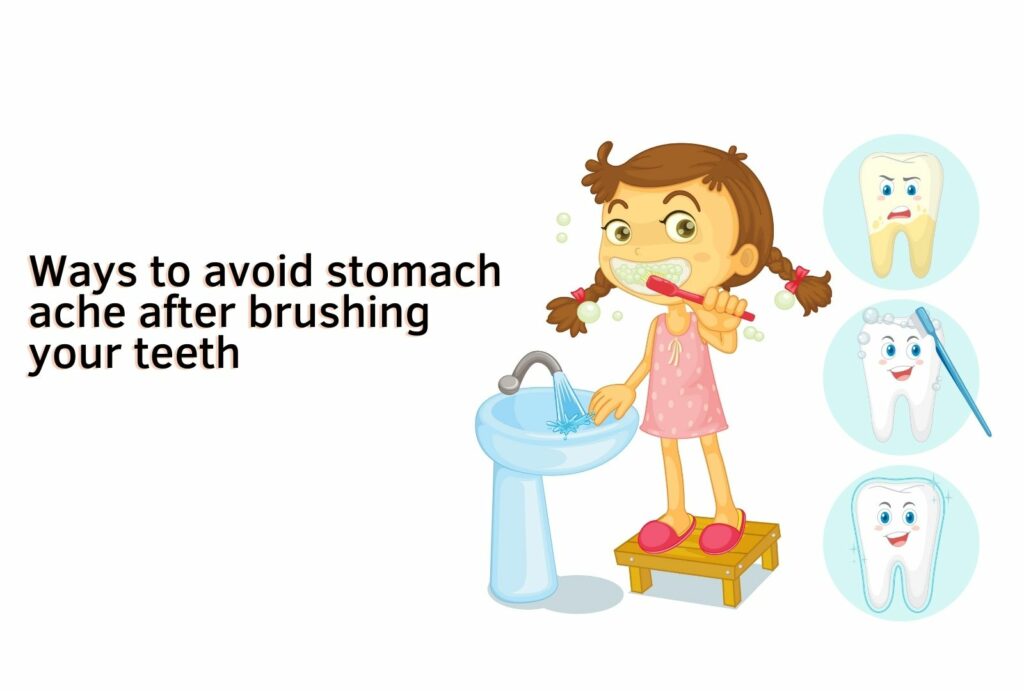
Why does my stomach hurt after I brush my teeth? This is a common question that many people ask. It can be frustrating and uncomfortable to experience stomach pain after brushing your teeth. There are several reasons why this might happen, and understanding them can help you take steps to avoid the discomfort.
One reason why does my stomach hurt after I brush my teeth is that toothpaste contains certain ingredients that can irritate the stomach. For example, some toothpaste brands contain sodium lauryl sulfate, which can cause digestive problems in some people. Additionally, some people may be sensitive to the flavorings or artificial sweeteners in toothpaste, which can also cause stomach upset.
Another reason why does my stomach hurt after I brush my teeth is that brushing your teeth can stimulate the vagus nerve, which runs from the brain to the stomach. This nerve is responsible for regulating many bodily functions, including digestion. When it is stimulated, it can cause the stomach to produce more acid, leading to stomach pain.
To avoid stomach ache after brushing, there are several steps you can take. First, try switching to a toothpaste that is free of sodium lauryl sulfate or other ingredients that may be causing your discomfort. You may also want to avoid toothpastes with strong flavorings or artificial sweeteners. Instead, choose a mild, natural toothpaste.
Another way to avoid stomach ache after brushing is to wait a little while after brushing before eating or drinking anything. This can give your stomach time to settle down and reduce the risk of acid reflux or other digestive problems. Additionally, try to brush your teeth after meals rather than before, as this can help to neutralize any acid in your stomach.
Finally, if you continue to experience stomach pain after brushing your teeth, it may be worth talking to your dentist or doctor. They can help you determine whether there is an underlying condition that is causing your discomfort and recommend appropriate treatment.
In conclusion, stomach ache after brushing your teeth is a common problem that many people experience. Understanding the reasons why this happens can help you take steps to avoid the discomfort. By choosing the right toothpaste, waiting to eat or drink after brushing, and talking to your dentist or doctor if necessary, you can keep your stomach happy and healthy.
Reasons why your stomach hurts after brushing teeth

Have you ever wondered why does my stomach hurt after I brush my teeth? While brushing your teeth is an essential part of maintaining good oral hygiene, it can sometimes lead to stomach discomfort. Here are some of the reasons why this might happen.
- One of the most common reasons why does my stomach hurt after I brush my teeth is due to the presence of certain ingredients in toothpaste. Sodium lauryl sulfate is a foaming agent found in many toothpaste brands, and it can cause digestive problems in some people. Additionally, some people may be sensitive to the artificial sweeteners or flavorings in toothpaste, which can also cause stomach discomfort.
- Another reason why does my stomach hurt after I brush my teeth is due to the stimulation of the vagus nerve. This nerve runs from the brain to the stomach and is responsible for regulating many bodily functions, including digestion. When it is stimulated, it can cause the stomach to produce more acid, leading to stomach pain.
- If you brush your teeth too hard, it can also lead to stomach discomfort. Brushing too hard can cause the gag reflex to kick in, leading to nausea and vomiting. This can also cause the stomach to produce more acid, leading to stomach pain.
- Gastroesophageal reflux disease (GERD) – Sometimes, stomach pain after brushing your teeth can be a symptom of an underlying condition. Gastroesophageal reflux disease (GERD) is a condition in which stomach acid flows back into the esophagus, causing heartburn and other symptoms. If you experience stomach pain after brushing your teeth regularly, it may be a good idea to consult with your doctor or dentist to rule out any underlying conditions.
To avoid stomach discomfort after brushing your teeth, you can take some steps. Choose a toothpaste that is free of sodium lauryl sulfate and artificial sweeteners or flavorings. Brush your teeth gently and avoid triggering the gag reflex. Wait for a little while after brushing your teeth before eating or drinking anything, as this can help to reduce the risk of acid reflux and other digestive problems.
In conclusion, there are several reasons why your stomach might hurt after brushing your teeth. By understanding these reasons, you can take steps to prevent stomach discomfort and maintain good oral hygiene. Choose the right toothpaste, brush your teeth gently, and wait before eating or drinking anything to keep your stomach healthy and happy.
Ways to avoid stomach ache after brushing your teeth

Experiencing stomach ache after brushing your teeth can be an uncomfortable and frustrating experience. Fortunately, there are several ways to avoid this discomfort and maintain good oral hygiene at the same time. Here are some tips on how to avoid stomach ache after brushing your teeth.
- One of the most important steps to take is to choose the right toothpaste. As mentioned before, some toothpaste brands contain ingredients that can irritate the stomach, such as sodium lauryl sulfate or artificial sweeteners. Look for a toothpaste that is free of these ingredients and has a mild flavor. You can also try natural toothpaste, which often contains gentle ingredients and can be just as effective.
- Another way to avoid stomach ache after brushing your teeth is to brush gently. Brushing too hard can cause the gag reflex to kick in, leading to nausea and vomiting. This can also cause the stomach to produce more acid, leading to stomach pain. Use a soft-bristled toothbrush and apply gentle pressure when brushing your teeth.
- Waiting for a little while after brushing your teeth before eating or drinking anything can also help to reduce the risk of stomach ache. This gives your stomach time to settle down and reduces the risk of acid reflux or other digestive problems. Additionally, try to brush your teeth after meals rather than before, as this can help to neutralize any acid in your stomach.
- Drinking water after brushing your teeth can also help to reduce stomach discomfort. Water can help to neutralize any excess acid in your stomach and promote healthy digestion. However, avoid drinking large amounts of water immediately after brushing your teeth, as this can dilute the toothpaste and reduce its effectiveness.
If you continue to experience stomach pain after brushing your teeth, it may be worth talking to your dentist or doctor. They can help you determine whether there is an underlying condition that is causing your discomfort and recommend appropriate treatment.
In conclusion, experiencing stomach ache after brushing your teeth can be a common problem, but it doesn’t have to be. By choosing the right toothpaste, brushing gently, waiting before eating or drinking anything, and drinking water after brushing, you can maintain good oral hygiene and keep your stomach healthy and happy.
FAQs
- Q: Why does my stomach hurt after I brush my teeth?
A: There are several reasons why you might experience stomach pain after brushing your teeth. Some toothpaste brands contain ingredients that can irritate the stomach, such as sodium lauryl sulfate or artificial sweeteners. Brushing too hard can also trigger the gag reflex and cause nausea and vomiting. Additionally, the stimulation of the vagus nerve during brushing can cause the stomach to produce more acid, leading to stomach pain.
- Q: What can I do to avoid stomach ache after brushing my teeth?
A: Choosing the right toothpaste, brushing gently, waiting before eating or drinking anything, and drinking water after brushing can all help to reduce the risk of stomach ache after brushing your teeth. Avoid toothpaste brands that contain sodium lauryl sulfate or artificial sweeteners, and use a soft-bristled toothbrush. Wait for a little while after brushing your teeth before eating or drinking anything, and drink water to help neutralize any excess acid in your stomach.
- Q: Can stomach pain after brushing my teeth be a symptom of an underlying condition?
A: In some cases, stomach pain after brushing your teeth can be a symptom of an underlying condition. Gastroesophageal reflux disease (GERD) is a condition in which stomach acid flows back into the esophagus, causing heartburn and other symptoms. If you experience stomach pain after brushing your teeth regularly, it may be a good idea to consult with your doctor or dentist to rule out any underlying conditions.
- Q: Is it normal to experience stomach discomfort after brushing my teeth?
A: While stomach discomfort after brushing your teeth is relatively common, it is not considered normal. If you experience stomach pain after brushing your teeth regularly, it may be a sign that something is not right. By following the tips outlined above, you can reduce the risk of stomach discomfort and maintain good oral hygiene at the same time.
- Q: Can brushing my teeth too often cause stomach ache?
A: Brushing your teeth too often can lead to stomach discomfort in some cases. This is because excessive brushing can cause the stomach to produce more acid, leading to stomach pain. Additionally, brushing too hard can trigger the gag reflex and cause nausea and vomiting. It is generally recommended to brush your teeth twice a day for two minutes each time.
To summarize
In conclusion, experiencing stomach ache after brushing your teeth can be a frustrating and uncomfortable experience, but it doesn’t have to be. By understanding the causes of stomach pain after brushing your teeth and taking steps to avoid it, you can maintain good oral hygiene and keep your stomach healthy and happy.
Some toothpaste brands contain ingredients that can irritate the stomach, such as sodium lauryl sulfate or artificial sweeteners. Brushing too hard can also trigger the gag reflex and cause nausea and vomiting. Additionally, the stimulation of the vagus nerve during brushing can cause the stomach to produce more acid, leading to stomach pain.
To avoid stomach ache after brushing your teeth, choose toothpaste that is free of irritants and has a mild flavor. Brush your teeth gently using a soft-bristled toothbrush, and wait for a little while before eating or drinking anything. Drinking water after brushing your teeth can also help to neutralize any excess acid in your stomach and promote healthy digestion.
If you continue to experience stomach pain after brushing your teeth, it may be worth talking to your dentist or doctor. They can help you determine whether there is an underlying condition that is causing your discomfort and recommend appropriate treatment.
In some cases, stomach pain after brushing your teeth can be a symptom of an underlying condition such as GERD. If you experience stomach pain after brushing your teeth regularly, it may be a good idea to consult with your doctor or dentist to rule out any underlying conditions.
Remember, experiencing stomach discomfort after brushing your teeth is relatively common but not considered normal. By following the tips outlined above, you can reduce the risk of stomach discomfort and maintain good oral hygiene at the same time. Choose the right toothpaste, brush gently, wait before eating or drinking anything, and drink water after brushing to keep your stomach healthy and happy.